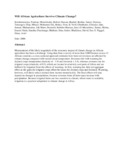Will African Agriculture Survive Climate Change?
| dc.contributor.author | Kurukulasuriya, Pradeep | |
| dc.contributor.author | Mendelsohn, Robert | |
| dc.contributor.author | Hassan, Rashid | |
| dc.contributor.author | Benhin, James | |
| dc.contributor.author | Deressa, Temesgen | |
| dc.contributor.author | Diop, Mbaye | |
| dc.contributor.author | Mohamed Eid, Helmy | |
| dc.contributor.author | Fosu, K Yerfi | |
| dc.contributor.author | Gbetibouo, Glwadys | |
| dc.contributor.author | Jain, Suman | |
| dc.contributor.author | Mahamadou, Ali | |
| dc.contributor.author | Mano, Renneth | |
| dc.contributor.author | Kabubo-Mariara, Jane | |
| dc.contributor.author | El-Marsafawy, Samia | |
| dc.contributor.author | Molua, Ernest | |
| dc.contributor.author | Ouda, Samiha | |
| dc.contributor.author | Ouedraogo, Mathieu | |
| dc.contributor.author | Séne, Isidor | |
| dc.contributor.author | Maddison, David | |
| dc.contributor.author | Seo, S. Niggol | |
| dc.contributor.author | Dinar, Ariel | |
| dc.date.accessioned | 2013-07-10T13:40:00Z | |
| dc.date.available | 2013-07-10T13:40:00Z | |
| dc.date.issued | 2006 | |
| dc.identifier.citation | Will African Agriculture Survive Climate Change? World Bank Econ Rev (2006) 20 (3): 367-388 | en |
| dc.identifier.uri | http://wber.oxfordjournals.org/content/20/3/367.short | |
| dc.identifier.uri | http://erepository.uonbi.ac.ke:8080/xmlui/handle/123456789/47125 | |
| dc.description.abstract | Measurement of the likely magnitude of the economic impact of climate change on African agriculture has been a challenge. Using data from a survey of more than 9,000 farmers across 11 African countries, a cross-sectional approach estimates how farm net revenues are affected by climate change compared with current mean temperature. Revenues fall with warming for dryland crops (temperature elasticity of −1.9) and livestock (−5.4), whereas revenues rise for irrigated crops (elasticity of 0.5), which are located in relatively cool parts of Africa and are buffered by irrigation from the effects of warming. At first, warming has little net aggregate effect as the gains for irrigated crops offset the losses for dryland crops and livestock. Warming, however, will likely reduce dryland farm income immedia-tely. The final effects will also depend on changes in precipitation, because revenues from all farm types increase with precipitation. Because irrigated farms are less sensitive to climate, where water is available, irrigation is a practical adaptation to climate change in Africa. | en |
| dc.language.iso | en | en |
| dc.publisher | University of Nairobi | en |
| dc.title | Will African Agriculture Survive Climate Change? | en |
| dc.type | Article | en |
| local.publisher | College of Humanities and Social Sciences | en |

